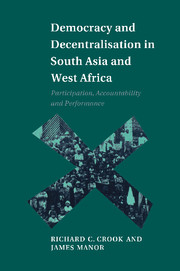4 - Côte d'Ivoire
Published online by Cambridge University Press: 12 October 2018
Summary
The socio-economic and political context
Côte d'Ivoire is one of the few sub-Saharan African states to have enjoyed a post-independence history of political stability and economic growth. Both characteristics have come under challenge more recently, with the commodity price slump of the 1980s, the subsequent squeeze on public finances and the move to multi-partyism in 1990. But decentralisation is still taking place within a context of dominant party rule and a legacy of effective but highly centralised administration. The stability and power of the ruling party, the Parti Démocratique de la Côte d'Ivoire (PDCI) survived the death in December 1993 of President Félix Houphouët- Boigny, following which Henri Konan Bédié, Speaker of the National Assembly, succeeded to the office of President in accordance with the Constitution. Bédié and the PDCI went on to win an overwhelming victory in the 1995 general elections, in the face of a violent opposition boycott of the presidential contest.
In spite of rapid urbanisation the economy of Côte d'Ivoire is still predominantly based on primary agricultural exports (coffee and cocoa). Commercialised agriculture developed much later and in a more restricted way in Côte d'Ivoire than in Ghana, and when it did it was associated with enormous waves of migration during the 1950s and 1960s from within the country or from the neighbouring West African states. Initially the majority of foreign migrants were employed as sharecroppers or labourers, but in the 1970s with the ‘cocoa rush’ in the far west of Côte d'Ivoire, many became farmers in their own right. By 1980 foreigners formed 41 per cent of the labour force. The average cocoa smallholding in Côte d'Ivoire is now around 6 hectares, but in the west migrants developed farms of between 9 and 14 hectares and there is also thought to be a small class of very large farmers, many from the upper urban elite of civil servants, business men and politicians - including the former President himself. But at the level of the small towns of the interior, social inequalities present the same kind of picture as in Ghana, except that the poorest groups of farmers and labourers are likely to be foreign migrants.
- Type
- Chapter
- Information
- Democracy and Decentralisation in South Asia and West Africa , pp. 136 - 201Publisher: Cambridge University PressPrint publication year: 1998

